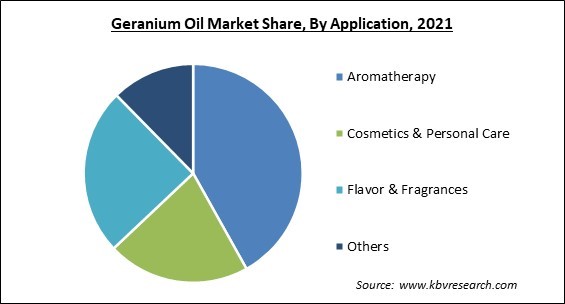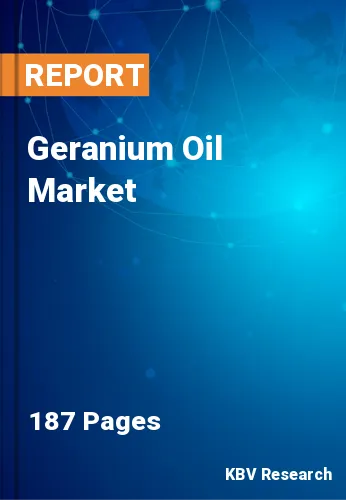The Global Geranium Oil Market size is expected to reach $120.2 million by 2028, rising at a market growth of 6.4% CAGR during the forecast period.
Geranium (genus Geranium), sometimes known as cranesbill, is a genus of roughly 300 perennial herbs and shrubs in the Geraniaceae family. Geraniums are one of the most popular greenhouses and bedding plants. Pelargonium, a closely related genus of annual, biennial, and perennial herbaceous plants usually known as geraniums, has about 280 varieties of yearly, semiannual, and perennial herbaceous plants. Pelargoniums are herbaceous to woody plants with thick fleshy leaves that range in a pattern of round to lobed to deeply cut; the flowers, which are borne in terminal clusters, range in color from white to pink to deep crimson and violet.

Hybrids make up the majority of cultivated species. There are double blooms, mixed colors, and tattered or frilled petals to choose from. Geraniums are generally propagated via stem cuttings, which can produce flowering plants in four to five months, although they can also be grown from seed. Breeding and selection have created seed geraniums with consistent symmetry, long flower stalks, and a tendency to lose flower petals quickly and cleanly.
Although the Geranium plant is native to South Africa, it is now grown all over the world, including in Central and South America, Europe, the Congo, Egypt, Russia, and Japan. Pelargonium graveolens is the Geranium species most often cultivated for the production of sweet-smelling lavender oil. Geranium Fundamental Oils may have different qualities depending on the country from whence the various varieties of Geraniums are grown.
The most widely grown geranium plant for the production of sweet-smelling essential oil is Pelargonium graveolent. In aromatherapy, the geranium essential oil is used to reduce stress, anxiety, sadness, fatigue, and tension. It also improves cognitive function, promotes focus, and regulates emotions and hormones. It's also utilized in personal care products to help eliminate dead cells, hold up the skin, induce new skin regeneration, and prevent aging signs. It has anti-inflammatory and antiseptic effects as well. It's supposed to boost immunity, enhance circulation, relieve menstruation and menopausal symptoms, lower blood pressure, and reduce discomfort. As a result, the use of geranium oil in therapeutic applications is increasing at an exponential rate, driving up demand for the oil.
COVID-19 caused delays and a basic minimum delivery of geranium oil due to lockdowns in various nations, despite Egypt being the biggest producer and having the largest raw material. It has a major detrimental influence on revenue growth in the industry. Furthermore, the market's revenue growth is likely to be hampered by the high cost of geranium oil. The Geranium Oil industry, like most others, has been badly disrupted, with the exception of medical supplies and life support equipment. COVID-19 erupted in China near the end of the year. Due to the enormous collapse of the financial system, it is possible that the growth rate of geranium oil would reduce in 2020.
Geranium essential oil is one of many essential oils that can be used to treat wounds. It contains antibacterial qualities, which means it can prevent germs and bacteria from growing on exposed wounds, thereby preventing infections. This not only prevents individuals from random illnesses, but also strengthens overall immune system. It helps the immune system to focus on greater problems rather than being undermined by peripheral toxins for no cause by taking proper care of cuts and scrapes. The geranium essential oil will help get rid of both round and tapeworms in the intestine. Worms in the system are exceedingly dangerous.
Body odor can be a major concern for each and every individual. While individuals may not be able to detect it, someone else would, and it would irritate them. No one wants to be around someone who stinks, which is why most people keep themselves clean and use deodorants daily to avoid this situation. Many people, however, avoid using deodorants because of the chemicals they contain. There is an herbal remedy for them, and the remedy is geranium essential oil. Geranium oil is suitable for use in deodorants for two reasons. The first is that it possesses antibacterial characteristics, ensuring that skin is always free from disease.

Producing a modest ounce of geranium oil, on the other hand, takes a ridiculously massive amount of geranium leaves. Furthermore, resource depletion is becoming a major concern for both consumers and producers. The production of geranium oil is an expensive procedure that requires a large investment in specialized equipment. Like any other essential oil, geranium oil may be rather costly. Even a small bottle of Essential oils might put a strain on finances. Plant components are used to make oils, and the environment in which the plants are grown has a big influence on the effectiveness and quantity of the oil produced. Even the presence of certain chemical additives in essential oil can be influenced by the plant's growth conditions as well as the cultivator's agricultural practices.
Based on Nature, the market is segmented into Conventional and Organic. The conventional segment acquired the highest revenue share in the geranium oil market in 2021. Conventional geranium oils are less expensive than organic geranium oils, which is one of the conventional segment's primary growth drivers. Steam distillation is used to extract the majority of both conventional and organic geranium oil from the geranium plant's leaves. Planting occurs during the best seasons, which are typically after the monsoon.
Based on Application, the market is segmented into Aromatherapy, Cosmetics & Personal Care, Flavor & Fragrances, and Others. The cosmetic & personal care segment registers a substantial revenue share in the geranium oil market in 2021. Geranium is an excellent addition to any cosmetics or healthcare product since its strong astringent characteristics encourage facial skin to contract, slowing the symptoms of aging and preventing drooping. An unexpected advantage is the beautiful geranium scent!
Based on Distribution Channel, the market is segmented into B2B Sales, Hypermarkets/Supermarkets, Specialty Stores, and Online Retail. The B2B sale segment garnered the highest revenue share in the geranium oil market in 2021. Due to the increased use of e-commerce platforms in emerging countries, as well as an increase in the number of deals or discounts made available by these sites, encourage end-users, especially home customers and institutions, to buy geranium oil through these platforms.
| Report Attribute | Details |
|---|---|
| Market size value in 2021 | USD 79 Million |
| Market size forecast in 2028 | USD 120.2 Million |
| Base Year | 2021 |
| Historical Period | 2018 to 2020 |
| Forecast Period | 2022 to 2028 |
| Revenue Growth Rate | CAGR of 6.4% from 2022 to 2028 |
| Number of Pages | 194 |
| Number of Tables | 358 |
| Report coverage | Market Trends, Revenue Estimation and Forecast, Segmentation Analysis, Regional and Country Breakdown, Companies Strategic Developments, Company Profiling |
| Segments covered | Nature, Application, Distribution Channel, Region |
| Country scope | US, Canada, Mexico, Germany, UK, France, Russia, Spain, Italy, China, Japan, India, South Korea, Singapore, Malaysia, Brazil, Argentina, UAE, Saudi Arabia, South Africa, Nigeria |
| Growth Drivers |
|
| Restraints |
|
Based on Regions, the market is segmented into North America, Europe, Asia Pacific, and Latin America, Middle East & Africa. The North America segment acquired a substantial revenue share in the geranium oil market in 2021. North America currently holds the largest share of the geranium oil market. This is mostly due to the region's widespread understanding of treatment modalities and aromatherapy. Geranium oil is in high demand both online and offline, which has aided regional market growth. The popularity of aromatherapy in nations such as the United States and Canada is fueling the region's rise.
Free Valuable Insights: Global Geranium Oil Market size to reach USD 120.2 Million by 2028
The market research report covers the analysis of key stake holders of the market. Key companies profiled in the report include Floral Essential Oil, Berjé, Inc., De Monchy Aromatics Ltd., VISAGENICS, Mother Herbs (P) Ltd., Sva Organics (Sri Venkatesh Aromas), Firmenich S.A., and Young Living Essential Oils LC.
By Nature
By Application
By Distribution Channel
By Geography
The global geranium oil market size is expected to reach $120.2 million by 2028.
Geranium Oil Prevent Bacterial Growth and prevents Worms are driving the market in coming years, however, The price of geranium oil is quite high and it limited the growth of the market.
Floral Essential Oil, Berjé, Inc., De Monchy Aromatics Ltd., VISAGENICS, Mother Herbs (P) Ltd., Sva Organics (Sri Venkatesh Aromas), Firmenich S.A., and Young Living Essential Oils LC.
The expected CAGR of the geranium oil market is 6.4% from 2022 to 2028.
The Aromatherapy segment acquired maximum revenue share in the Global Geranium Oil Market by Application in 2021, thereby, achieving a market value of $48.3 Million by 2028.
The Europe market dominated the Global Geranium Oil Market by Region in 2021, and would continue to be a dominant market till 2028; thereby, achieving a market value of $40.9 Million by 2028.
Our team of dedicated experts can provide you with attractive expansion opportunities for your business.

